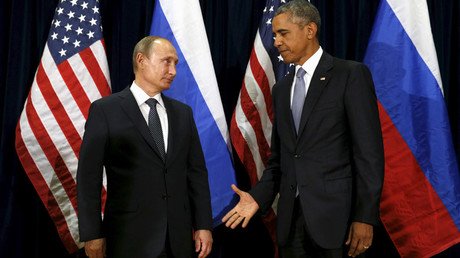US to offer Russia ‘synchronized airstrikes on ISIS, guided from joint HQ’ - media
The US reportedly seeks to create a joint HQ with Russia to share intelligence and conduct “synchronized” strikes on Islamists in Syria. The plan, if approved, would see unusually deep military-to-military ties for the two nations amid uneasy relations.
The draft proposal was obtained by the Washington Post and published ahead of a planned meeting between US State Secretary John Kerry with Russia’s Foreign Minister Sergey Lavrov in Moscow. Judging by the leaked content, the proposal goes far beyond recent agreements between the US and Russia on flight safety during two countries’ air operations over Syria.
If included in the Lavrov-Kerry agenda on Thursday, the plan may oddly contrast with the recently-proclaimed “deterrence” policy towards Russia. At a NATO summit in Warsaw last week, the US-led bloc agreed to counter a “resurgent Russia” by deploying troops and combat vehicles in Eastern Europe.
In the Mediterranean Sea, the US until recently maintained two carrier strike groups, including the USS Dwight Eisenhower and USS Harry Truman with their escort ships to “send a message” to the Russian Navy, which is there to support anti-Islamic State (IS, formerly ISIS/ISIL) efforts by Russia’s Air Force and the Syrian military.
The leaked proposal describes a unified command-and-control structure, called the Joint Implementation Group (JIC), to be installed outside the Jordanian capital, Amman.
“Subject matter experts and professionals with expertise in intelligence, targeting and air operations” would be among the JIC staff, with a Russian and an American colonels “or civilian employees of equivalent ranks” acting as senior officers on either side.
The initial objective of JIC operation, the paper goes on, is “to maximize independent, but synchronized, efforts” against IS and Al-Nusra Front terrorists in Syria. If everything goes as planned, Russian and US militaries may “permit integrated operations” that include assisting each other in air raids, according to the Washington Post.
‘You created ISIS!’: Press conference scandal mars Kerry’s visit to Italy https://t.co/jsX9nKh682pic.twitter.com/baPyFfnscG
— RT (@RT_com) February 4, 2016
Moscow has long proposed that the US-led coalition should fly joint combat missions with the Russian Air Force in Syria. In late May, Defense Minister Sergey Shoigu said Russia had proposed “planning and conducting strikes against Al-Nusra Front, which does not support the ceasefire.”
The US has responded without enthusiasm.
"We do not collaborate or coordinate our operation with the Russians,” DoD spokesman Matthew Allen told Russia's Sputnik website, claiming Moscow’s support to Syrian President Bashar Assad “is like pouring fuel on a fire."
Russia proposes US-led coalition to strike Syrian terrorists with Moscow – def minister
This time, however, the draft proposal says “Russia can use airpower in defense of Syrian government forces in the event of attack by [Al-Nusra Front] … if agreed in advance with the United States.”
In turn, “the Syrian military can employ military action, including air activities, against the Nusra Front outside of designated areas if Nusra acquires territory there.”
Notably, Syrian Air Force would be prohibited from operating in “designated areas” except flying medevac, humanitarian and personnel recovery missions, while Russia would be obliged to report “all regime air operations” to the JIC.
The ultimate goal of the proposal is said to be a “durable national ceasefire” in Syria, leading to a political transition.
A US government source later confirmed the authenticity of the proposal to TASS, saying that Washington intends to “continue to discuss these issues with Russia.” Another US government source also did not deny the draft’s authenticity but refused to comment on the “details of the documents that have not yet been approved or agreed upon.”














